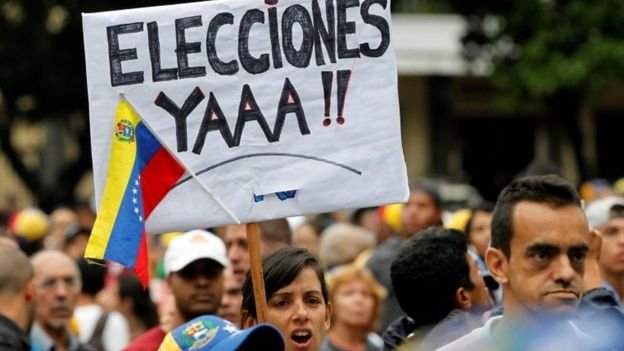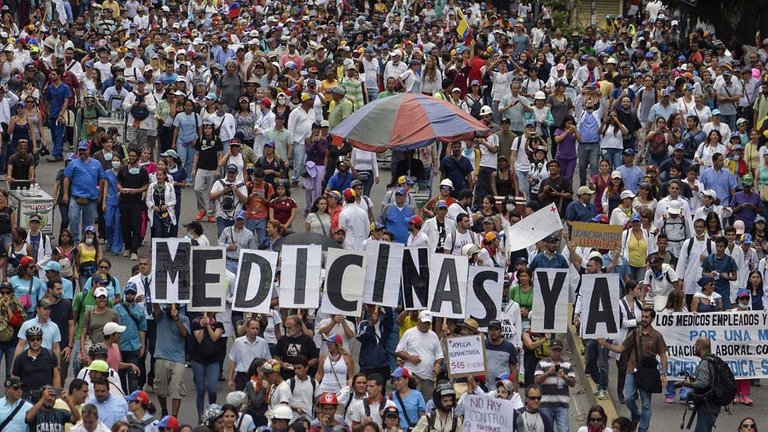A look at the country's ongoing protests against the government of President Maduro and the current political situation.
STORY HIGHLIGHTS
How did protests start?
Other problems in Venezuela
Latest developments
Caracas, the capital of Venezuela, saw almost daily demonstrations from April to June, some of which turned violent.

The opposition accuses President Nicolas Maduro of moving towards a dictatorship, and want him to resign. But Maduro says the opposition is conspiring with foreign entities, specifically the United States, to destabilise the country.

Here is how it all started.
How did the protests start?
Legislators election suspended. In January 2016, the Supreme Court suspended the election of four legislators - three that were enrolled with the opposition and one with the ruling party - for alleged voting irregularities.

The opposition accused the court of trying to strip them of their super-majority, and went ahead and swore in three of the legislators in question.

Supreme Court takes over the National Assembly. In response, the Supreme Court ruled that the entire National Assembly was in contempt and all decisions it made would be null.
The deadlock continued when the court suspended a stay-or-go referendum against Maduro and postponed regional elections until 2017.
After the National Assembly refused to approve the country's state-run oil company, PDVSA, from forming joint ventures with private companies, the Supreme Court ruled on March 30 that it will take over the Congress' legislative powers.
Protests start. On the next day, protesters in Caracas took to the streets to protest the court's take-over the National assembly.
The court quickly reversed its decision on April 1, but street protests continued on an almost daily basis for over three months with regular clashes exchanges of rocks and tear gas between young protesters and National Guard troops.

Demonstrators also protested hyperinflation and shortages of food and medicines in the country.
"We are protesting because we are in disagreement with the government of Nicolas Maduro. We are experiencing a serious crisis that is suffocating us
LEONARDO BRUZUAL. JOURNALIST
Problems in Venezuela
Hyperinflation. Venezuela's inflation rate, which has been over 50 percent since 2014, reached 536.2 percent in 2017 largely due to the rapid depreciation of the local currency on the black market, the opposition-controlled National Assembly said on October.
The International Monetary Fund estimates that inflation will reach 2,068.5 percent by 2018.
Economic war. The government says it is the victim of an "economic war", including speculation and hoarding, by pro-opposition businessmen. Venezuela's currency has weakened sharply on the black market.
Food shortages. The government controls the price of basic goods, but the black market still has a powerful influence on prices. Prices on basic goods can change in a matter of days, causing severe food shortages.
The often leads to food shortage which reflects in the long lines of people inside and outside supermarkets and the attempts to cross the border with Colombia to buy basic goods.

Oil output. Venezuela's oil production, which has been falling by about 20,000 barrels per day (bpd) since last year, is on track to fall by at least 250,000 bpd in 2017.
Refinancing its debt. However, the country's President Nicolas Maduro has dismissed the possibility of a default, adding that Venezuela would instead work on refinancing and restructuring its foreign debt.
Health assistance. The economic crisis is also hitting Venezuela's public health system the hardest. In the country's public hospitals, medicine and equipment are increasingly not available.
"Most of the time patients die because their families are out of the hospital looking for the treatments and they don't come at a time we can use the treatment, when they bring the treatment, the patient's already dying," Orfram Moreno, a doctor working in a public hospital in Merida told Al Jazeera.
Crime and poverty. Crime and violence are also widespread. In 2016, 27,479 people were killed - an all-time high - according to the independent group the Venezuelan Violence Observatory.
Political opposition
Democratic Unity Roundtable. Venezuela's political opposition has been represented mainly by the Democratic Unity Roundtable (MUD), a coalition of different parties including centrist, centre-left, left-wing and centre-right parties.
Many Venezuelans distrust parts of the coalition, which includes figures who were active in politics decades ago.
The strength of the coalition has also been hit by internal power struggles as well as disagreements over ideology and policy.
Latest developments
On March 2018, Venezuela postponed its upcoming presidential vote from the original date of April 22 to May 20 following a pact between Maduro's government and some opposition parties.
On February 2018, Venezuela officially launched the pre-sale of its new digital currency called the petro.
According to the government, the petro is backed by oil, gas, gold and diamonds, and is meant to help overcome US and EU sanctions.
President Donald Trump signed an executive order barring any US-based financial transactions involving Venezuela's new cryptocurrency as US officials warned that it was a "scam".
On December 10, President Nicolas Maduro announced that the opposition parties that boycotted the latest municipal elections were no longer part of the political landscape and would not be able to participate in presidential elections.
Hi! I am a robot. I just upvoted you! I found similar content that readers might be interested in:
https://www.aljazeera.com/indepth/features/2017/04/venezuela-happening-170412114045595.html
Hey @romayj, great post! I enjoyed your content. Keep up the good work! It's always nice to see good content here on Steemit! Cheers :)
Thanks for your comments! I'm glad you liked it!
Congratulations @romayj! You have completed some achievement on Steemit and have been rewarded with new badge(s) :
Click on any badge to view your own Board of Honor on SteemitBoard.
For more information about SteemitBoard, click here
If you no longer want to receive notifications, reply to this comment with the word
STOPDo not miss the last announcement from @steemitboard!
Thank you so much!